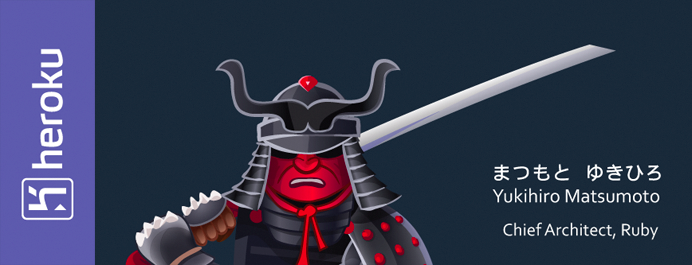Yukihiro Matsumoto now works at Heroku

Today, July 13, language developer Ruby Yukihiro Matsumoto , joined cloud startup Heroku (a division of Salesforce ). In this article, matz answers several questions regarding the future of Ruby.
(Note: this translation is based on the English text from the New Bamboo blog, which in turn is based on a Japanese article by Junichi Niino .)
“I'm getting ready to speed up Ruby development” - an interview with Yukihiro Matsumoto about joining Heroku as chief architect
Date: July 13, 2011.
')
Introduction
As I mentioned in the previous article, it became known that Yukihiro Matsumoto (Matz) had joined the Heroku as the chief architect of Ruby. I asked him a few questions about the reasons for this decision and his future tasks by email.
My goal is to improve the quality and functionality of the Ruby core.
PublicKey (hereinafter referred to as Q): Tell us how it happened.
Y. Matsumoto (hereafter Matz): In our last meeting with Mark Benioff [Marc Benioff] (CEO of Salesforce.com), he asked how he could support the development of Ruby.
I explained that I want to improve the situation in which most of the developers of the Ruby kernel are: they either work in their spare time, or they have to worry about not losing their jobs.
He said he could offer us help, and so I joined Salesforce through Heroku. (Note: The possibility of taking on a few more Ruby core developers at work in Heroku is currently under discussion).
So, our main work will remain the same. Our goal is to develop the core of Ruby, improving its functionality and quality. Now I have a stable place to work, and reviews of Ruby from its most active users, such as Heroku, will speed up Ruby development. Otherwise, there would be no point in accepting this offer.
However, my joining Heroku as chief architect does not mean that I promise Heroku or Salesforce.com loyalty. This does not affect my relationship with NaCl or Rakuten , which, as before, will support me; besides, I remain the chairman of the Ruby Association .
If we talk about the position, then I chose from several of the proposed options namely the “chief architect” [Chief Architect], since it sounds most neutral with respect to the business. In the future, I'm not going to make any business decisions related to Heroku.
Q: What do you expect from your position in Heroku?
Matz: As I said, by and large, nothing will change, but Ruby development will be faster. In addition, I would like to work more closely with the Heroku team to fix everything that prevents the use of Ruby in cloud environments.
I would like to maintain good relations with other companies, for example, Engine Yard and VMware, and to maintain their trust in Matz in Ruby even after I started working at Heroku.
Q: What are you thinking about using Ruby in the cloud?
Matz: To be honest, most of the Ruby core developers (including me) are not very interested in Internet technologies, but it's obvious to us that cloud computing is becoming more and more important, so I would like to get more information about using Ruby in cloud environments and use it for the future development of Ruby.
Q: Are you going to work in Silicon Valley, or remotely from Matsue ?
Matz: I do not want to change my lifestyle (however, my work style can change), so most likely I will work remotely from Matsue.
Now it does not seem to me that moving to Silicon Valley should make me happier.
Despite this, I would like to communicate directly with colleagues from San Francisco / Silicon Valley (including Heroku) several times a year.
(Note: To be precise, the main office of Heroku is located in San Francisco, not in Silicon Valley, but the press release says "Silicon Valley company").
Q: Anything else?
Matz: I heard that a lot of people (outside of Japan) are not aware that the Ruby core development team has not yet had a sustainable development model. I hope that my example will become a model for Japanese software developers, also published in Japan.
Q: Thank you.
Source: https://habr.com/ru/post/124036/
All Articles